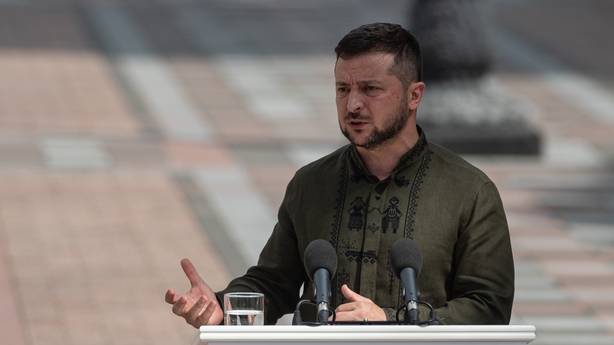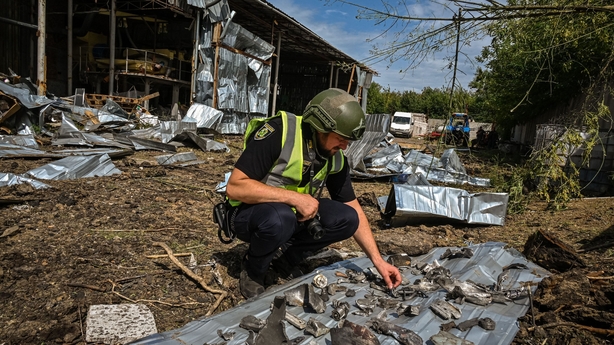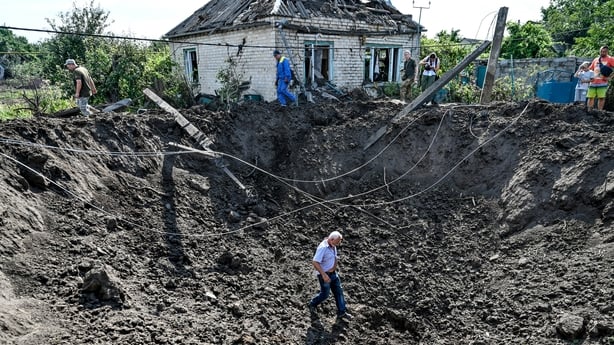Ukrainian President Volodymyr Zelensky has vowed to restore Ukrainian rule over Russia-annexed Crimea, a move that he said would help re-establish "world law and order".
He told an international conference on Crimea that regaining control of the peninsula - seized and annexed by Russia in 2014 in a move not recognised by most other countries - would be the "biggest anti-war step".
"It all began with Crimea, and it will end with Crimea," Mr Zelensky said in an opening address to the Crimea Platform, a forum that seeks to restore Ukraine's territorial integrity and end Russia's annexation of the region.
Calling for victory over Russia, he said: "It is necessary to liberate Crimea from occupation ... This will be the resuscitation of world law and order."
Mr Zelensky said representatives of about 60 states and international organisations participated in the summit, including about 40 presidents and prime ministers.
Almost all took part online, but Polish President Andrzej Duda attended in person.
He urged global leaders not to turn a blind eye to what he depicted as Russian aggression, and said there could be no return to business as usual with Moscow.
"Crimea was, remains and will be a part of Ukraine just like Gdansk is a part of Poland, Nice is a part of France, Cologne is a part of Germany, and Rotterdam is a part of Netherlands," Mr Duda said.
Taoiseach Micheál Martin told the conference that "If Russia is allowed to succeed, no country can truly be said to be safe."
He repeated his "unequivocal support" for Ukraine's bid for EU membership.

Financial assistance
Russia shows no sign of abandoning Crimea, home to its Black Sea fleet, and has used the peninsula as a platform to launch missile strikes on Ukrainian targets.
It has denied accusations of human rights abuses in Crimea, and says a referendum held after Russian forces seized the peninsula showed Crimeans genuinely want to be part of Russia.
The referendum is not recognised by most countries.
Mr Zelensky said Russia had turned Crimea into "an ecological disaster zone and a military springboard for aggression".
In a video linkup, British Prime Minister Boris Johnson said the Russian "land grab (of Crimea) in 2014 was the direct precursor of today's war" and accused Russia of turning it into "an armed camp, from which to threaten the rest of Ukraine".
French President Emmanuel Macron urged non-European countries to support Ukraine against Russia, adding: "It's about our universal values."
Ukrainian Prime Minister Denys Shmygal said separately that foreign assistance since the invasion had reached $14 billion, and that Ukraine hoped to receive a further $12-$16bn from foreign partners by the end of this year.

Independence Day
As Ukraine prepared to mark both its independence from Soviet-rule in 1991 and the six months since Russian troops invaded, Mr Zelensky pledged that any Russian attacks in or around the date would provoke a powerful response.
Despite his defiance, there was concern among Ukrainian and allied western officials that Russia was preparing to attack the capital Kyiv once again.
Citing security concerns, the Ukrainian government has banned celebrations in Kyiv on tomorrow's anniversary of independence.
Earlier, Mr Zelensky had warned that Russia might try "something particularly ugly" in the run-up to Independence Day.
Asked at a news conference with Mr Duda about the possibility of a Russian missile strike on Kyiv, Mr Zelensky said there was a daily threat of attacks although the number of them could increase.
Ukraine's response would be the same for any city that comes under attack from Russia, he said.
"They will receive a response, a powerful response," Mr Zelensky said.
"I want to say that each day ... this response will grow, it will get stronger and stronger."
US warns citizens to leave Ukraine
The United States said it believed Russia would target civilian and government infrastructure in the next few days.
US citizens should leave Ukraine "now" by their own means if it was safe to do so, the US Embassy said.
Fears of an intensified Russian assault have mounted after Russia's Federal Security Service yesterday accused Ukrainian agents of killing Darya Dugina, in a car bomb attack near Moscow that Russian President Vladimir Putin called "evil".
Ukraine denies involvement.
Kyiv has only rarely been hit by Russian missiles since Ukraine repelled a ground offensive to seize the capital in March.
The mood in Kyiv was calm today, with many people still walking the streets, but signs of increased threat could be felt.
An adviser to Mr Zelensky told the BBC many civilians were trying to leave Kyiv for fear of a sudden Russian attack.
Authorities told Ukrainians to work from home where possible until Thursday, also urging people to take air raid warnings seriously and seek shelter when sirens sound.
The Kyiv city administration banned large public gatherings until Thursday, fearing that a crowd of celebrating residents could become a target for a Russian missile strike.
We need your consent to load this rte-player contentWe use rte-player to manage extra content that can set cookies on your device and collect data about your activity. Please review their details and accept them to load the content.Manage Preferences
Zaporizhzhia fears
Russia has carried out further artillery and air strikes in the Zaporizhzhia region, Ukraine's General Staff said, where fighting near Europe's largest nuclear power plant has raised fears of a catastrophic nuclear incident.
The two sides have traded blame over frequent shelling at the plant, where Ukraine accuses Russia of basing troops and storing military hardware. Russia denies this and accuses Ukraine of targeting Zaporizhzhia with drones.
Ukrainians living nearby voiced fears shells could hit one of the plant's six reactors, with disastrous consequences.
"Of course, we are worried... It's like sitting on a powder keg," Alexander Lifirenko, a resident of the nearby town of Enerhodar, said.

Moscow requested a UN Security Council meeting be held today to discuss the Zaporizhzhia plant, Russian state-owned news agency RIA reported, citing Deputy Ambassador to the UN Dmitry Polyanskiy.
The UN nuclear watchdog will visit the plant within days if talks to gain access succeed, it said in a statement.
"I'm continuing to consult very actively and intensively with all parties," the International Atomic Energy Agency's statement quoted IAEA chief Rafael Grossi as saying.
"The mission (to Zaporizhzhia) is expected to take place within the next few days if ongoing negotiations succeed."
Read more:
Irish Embassy in Ukraine reopens
Ukrainian refugees begin to leave student accommodation
Latest Ukraine stories
Russia launched on 24 February what it calls a "special military operation" to demilitarise its smaller neighbour and protect Russian-speaking communities. Ukraine and its Western backers accuse Moscow of waging an imperial-style war of conquest.
Stalemate
Six months on from the Russian invasion, which has caused thousands of deaths, forced over a third of Ukraine's 41 million people from their homes and destroyed whole cities, the conflict is largely locked in a stalemate.
Russian forces control a large swathe of the south, including along the Black Sea and Sea of Azov coasts, and chunks of the eastern Donbas region. The prospects for peace look almost non-existent.
"We feel good, trusting that victory will be on our side,only ours, there is no other option," Yevhen, a Ukrainian soldier, said as his frontline unit fired off several howitzer shells towards Russian positions from a field in the Donbas.
Russian shelling hit Kharkiv in the northeast - Ukraine's second largest city - around dawn, regional governor Oleh Synehubov said. A house was hit but no one hurt, he said.
In the south, Ukraine's southern military command said Russian forces pressed attacks along front lines of areas they occupy, including multiple rocket strikes on the town of Marhanets across the Dnipro River from the Russian-held Zaporizhzhia nuclear power plant.
Two civilians were hurt and several homes, gas and water pipelines were damaged, it said.
It added that Ukrainian rockets and artillery had destroyed an ammunition depot and command post of a Russian airborne assault regiment in Chernobaevka in the Russian-occupied Kherson region, southwest of Zaporizhzhia.
Artillery and rocket fire near the nuclear reactor complex, has stirred international calls for the area to be demilitarised.
United Nations
The Office of the UN High Commissioner for Human Rights, citing its monitoring mission in Ukraine, said yesterday that 5,587 civilians had been killed and 7,890 wounded between 24 February and 21 August, mainly from artillery, rocket and missile attacks.
UNICEF, the UN children's agency, said at least 972 children have been killed or injured over six months of war.
"The use of explosive weapons has caused most of the child casualties. These weapons do not discriminate between civilian and combatant, especially when used in populated areas as has been the case in Ukraine," UNICEF Executive Director Catherine Russell said in a statement.
Separately, General Valeriy Zaluzhnyi - Ukraine's army chief - provided what appeared to be the first public Ukrainian military death toll, saying nearly 9,000 soldiers had died in action.
Russia has not said how many of its soldiers have been killed. Ukraine's General Staff has estimated the Russian military death toll at 45,400.
Reuters has been unable to verify military losses.

